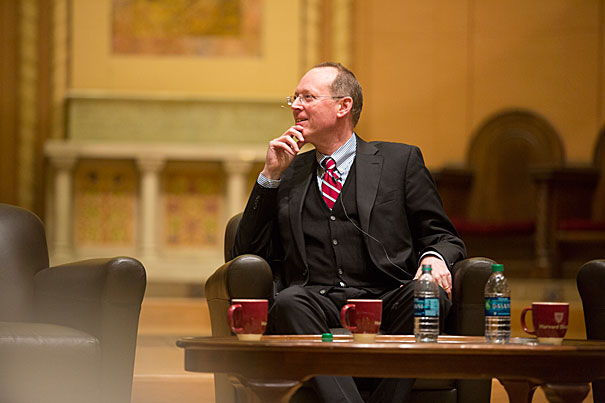
Paul Farmer (photo 1), Harvard’s Kolokotrones University Professor of Global Health and Social Medicine, spoke about liberation theology and his latest book during at a discussion at the First Church in Cambridge with David Carrasco, the Neil L. Rudenstine Professor of the Study of Latin America, and Divinity School student Lauren Taylor (photo 2).
Rose Lincoln/Harvard Staff Photographer
A faith in global care
Paul Farmer, Partners In Health founder, was inspired by liberation theology
Paul Farmer remembers the day in 1980 when Salvadoran Archbishop Oscar Romero was gunned down while celebrating Mass.
The assassination caught the attention of the young Duke University undergraduate and made him curious about Romero’s beliefs, which were so important to the prelate that he put his life at risk, and which were considered so dangerous by others that they killed him.
So Farmer started reading about liberation theology, a Roman Catholic movement that challenged the institutional structures of society that perpetuated the destitution in Latin America. Farmer said Tuesday that liberation theology provided the moral underpinning for his work with the global poor, including that of the international nonprofit he co-founded in the 1980s, Partners In Health.
Farmer, Harvard’s Kolokotrones University Professor of Global Health and Social Medicine, said during a discussion at the First Church in Cambridge that those early readings provided him with important background for his work in Haiti in the 1980s, when he witnessed abject poverty and suffering and had to decide how to respond to it. In the end, instead of pulling away or trying to rationalize it, he decided he would not just be a “spectator to poverty.”
That decision ultimately led to the founding of Partners In Health, which has saved thousands of lives and improved health in some of the poorest parts of the world.
Farmer described the impact liberation theology had on him during the session with David Carrasco, the Neil L. Rudenstine Professor of the Study of Latin America, and Divinity School student Lauren Taylor. The three discussed Farmer’s latest book, “In the Company of the Poor,” co-authored with the Rev. Gustavo Gutierrez, author of the 1971 book “A Theology of Liberation,” which gave the movement its name. The event was sponsored by Harvard Divinity School’s Science, Religion, and Culture Program.
Farmer spoke of “structural violence” in society, of deprivation and death with poverty and inequality as its root cause. He said Partners In Health has sought to counteract that by trying to understand the poor’s point of view while designing programs. Instead of throwing up their hands at patients who fail to take medications and decrying them as lazy or ignorant, officials at Partners In Health instead ask patients why they don’t take their prescriptions and works to lower costs, increase access, and remove other roadblocks.
“Instead of saying ‘failure to adhere,’ [we ask] them how we failed them, how we can remove the barriers to good health,” Farmer said.
Farmer said that an important aspect of the organization’s work is that it has always been conducted in tandem with local partners, leaders, and participants. He quoted a response by Gutierrez, who is now a professor at the University of Notre Dame, when he was asked what his final words to a class would be.
“He said that the first thing I’d teach them is that the first person is not ‘I am,’ it’s ‘You are,’” Farmer said, “and that’s the answer to the question about staying power. It’s ‘We are.’ That’s why we’re still there.”
Being able to watch people’s health improve helps as well. Infant mortality in Haiti is way down from the 1980s. Farmer said he recently visited a hospital the organization founded on the Central Plateau and saw 20 nurses and doctors treating 11 people who’d come in at once after an auto accident. Years earlier, he said, such cases would have been a nightmare for the smaller clinics the organization ran. Seeing the smooth operation of the staff at the year-old hospital was “like dying and going to heaven,” Farmer said.
Similarly, he said, health has rapidly improved in Rwanda, where Partners In Health also works. Infant mortality has plunged, while life expectancy has doubled over the last 15 years.
“I’m proud of what we’ve done,” Farmer said.




